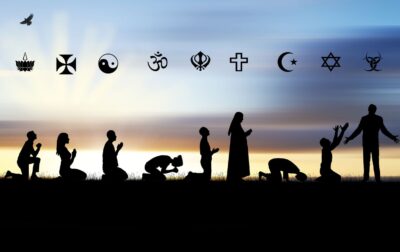Controversial Religious Topics have long been a focal point of debate, sparking impassioned discussions and challenging entrenched beliefs. In a world rich with diverse faith traditions and perspectives, these topics delve into the very core of human existence, touching on issues of morality, spirituality, and societal norms.
From questions surrounding the existence of a higher power to debates on the interpretation of sacred texts, Controversial Religious Topics compel us to confront our deepest convictions and grapple with the complexities of faith in the modern age.
Should Controversial Religious Topics be discussed?
Discussing controversial religious topics can be both enlightening and challenging. On one hand, it can foster understanding and empathy among people with different beliefs, leading to greater tolerance and acceptance. On the other hand, it can also spark heated debates and potentially offend individuals who hold deeply-held religious convictions.
When engaging in discussions about controversial religious topics, it’s essential to approach the conversation with respect, empathy, and an open mind. It’s important to listen actively to others’ perspectives without dismissing or belittling them, even if you disagree.
Moreover, discussing controversial religious topics can provide an opportunity for critical thinking, self-reflection, and growth. By examining different viewpoints and exploring the complexities of religious beliefs, individuals can deepen their understanding of themselves and others.
However, it’s crucial to recognize that not all discussions about religious topics are productive or appropriate in every context. Sensitivity to cultural and personal beliefs, as well as the potential for harm or offense, should guide whether and how these topics are discussed.
Ultimately, respectful and thoughtful dialogue can contribute to greater mutual understanding and promote peaceful coexistence in diverse societies.
200 Controversial Religious Topics

Here’s a breakdown of 200 controversial religious topics across various categories:
Theology and Doctrine
- Existence of God
- Nature of God (omniscience, omnipotence, omnibenevolence)
- Problem of evil
- Divine providence vs. free will
- The Trinity
- Predestination vs. free will
- Original sin
- Salvation and atonement
- Efficacy of prayer
- Theodicy (the justice of God)
- Reincarnation vs. resurrection
- Divine judgment and afterlife
- Concept of heaven and hell
- Divine inspiration of scripture
- Inerrancy of scripture
- Interpretation of scripture
- Role of tradition in theology
- Faith vs. reason
- Miracles and supernatural events
- Relationship between science and religion
Ethics and Morality
- Abortion
- Contraception
- Euthanasia
- Capital punishment
- Just war theory
- Pacifism
- LGBTQ+ rights and relationships
- Gender roles and equality
- Animal rights and treatment
- Environmental stewardship
- Ethical treatment of other religions
- Ethical treatment of non-believers
- Ethical implications of religious rituals
- Medical ethics (e.g., blood transfusions, organ donation)
- Poverty and social justice
- Economic inequality
- Immigration and refugees
- Globalization and cultural preservation
- Ethical implications of technology (e.g., AI, cloning)
Religious Practices and Rituals
- Worship practices (e.g., prayer, meditation, fasting)
- Rituals of initiation (e.g., baptism, confirmation, circumcision)
- Religious dress codes
- Dietary restrictions (e.g., kosher, halal)
- Sacred spaces and pilgrimage
- Sacrifice and offering
- Observance of holy days and festivals
- Religious symbols and iconography
- Use of music and art in worship
- Rituals surrounding birth and death
- Use of psychedelics in religious rituals
Interfaith Relations
- Interfaith dialogue and cooperation
- Religious pluralism vs. exclusivism
- Proselytism and conversion
- Syncretism and cultural blending
- Religious tolerance and intolerance
- Religious persecution and discrimination
- Coexistence in multicultural societies
- Interfaith marriage
- Interfaith conflicts and historical tensions
- Diplomatic relations between religious institutions
Sects and Denominations
- Religious sectarianism
- The authority of religious leaders
- Branches of Christianity (Catholicism, Protestantism, Orthodoxy)
- Sects within Islam (Sunni, Shia, Sufism)
- Denominations within Judaism (Orthodox, Conservative, Reform)
- Eastern vs. Western interpretations of Buddhism
- Hindu sects and schools of thought (Vaishnavism, Shaivism, etc.)
- New religious movements and cults
- Fundamentalism vs. liberal theology
- Apostasy and excommunication
Historical and Societal Impact
- Role of religion in the founding of nations
- Religious influence on laws and governance
- Church-state separation
- Theocracy vs. secularism
- Impact of religious wars and conflicts
- Role of religion in social movements (e.g., civil rights, abolitionism)
- Historical atrocities committed in the name of religion
- Religious influence on education
- Censorship and freedom of expression in religious contexts
- Religious influence on art, literature, and culture
Contemporary Issues
- Religious extremism and terrorism
- Radicalization and recruitment tactics
- Hate speech and incitement to violence in religious contexts
- Role of social media in religious discourse
- Religious responses to globalization
- Commercialization of religion
- Mega-churches and prosperity gospel
- Televangelism and fundraising tactics
- Religious lobbying and political influence
- Accountability and transparency within religious institutions
Mysticism and Esotericism
- Mystical experiences and visions
- Role of mystics and spiritual guides
- Practices of asceticism and self-denial
- Esoteric interpretations of scripture
- Occultism and magical practices
- Astrology and divination
- Altered states of consciousness in religious practice
- Near-death experiences and afterlife beliefs
- Astral projection and out-of-body experiences
- Secret societies and hidden knowledge
Ethics of Belief and Disbelief
- Atheism vs. agnosticism
- Religious skepticism and criticism
- Intellectual honesty in religious inquiry
- The burden of proof in religious claims
- Pascal’s Wager and other arguments for belief
- Religious indoctrination and childhood belief
- Deconversion stories and testimonies
- Moral implications of belief or disbelief
- The psychology of belief formation
- The role of doubt in religious faith
Cultural and Regional Variations
- Indigenous religions and spirituality
- Folk religion and superstitions
- Religious syncretism in different cultures
- Influence of colonialism on religious practices
- Regional variations in religious beliefs and customs
- Tribal conflicts over religious differences
- Rituals surrounding birth, marriage, and death in different cultures
- Religious festivals and celebrations unique to certain regions
- Traditional medicine and healing practices tied to religion
- Impact of globalization on indigenous religious traditions
Gender and Sexuality
- Patriarchy and gender hierarchy in religious institutions
- Women’s roles in religious leadership
- The ordination of women
- Feminist theology
- LGBTQ+ acceptance in religious communities
- Same-sex marriage and religious rites
- Transgender rights and religious perspectives
- Gender segregation in religious spaces
- Religious views on reproductive rights
- Celibacy and religious vows
Science and Religion
- Evolution vs. creationism
- Intelligent design vs. natural selection
- Conflict between religious beliefs and scientific evidence
- Religious objections to certain scientific advancements (e.g., stem cell research)
- The role of religion in promoting scientific inquiry
- Historical clashes between religion and science
- Religious interpretations of cosmology and the origins of the universe
- Ethical considerations in scientific research from religious perspectives
- Quantum physics and consciousness in religious discourse
- The ethics of genetic engineering and cloning from religious perspectives
Technology and Future Trends
- Artificial intelligence and religious implications
- Transhumanism and religious objections
- Virtual reality and religious experiences
- Space exploration and the search for extraterrestrial life from religious perspectives
- Bioethics in the age of biotechnology
- The impact of automation on religious communities
- Ethical considerations in data privacy and surveillance from religious perspectives
- The role of religion in shaping future societies
- Religious responses to existential risks (e.g., climate change, nuclear warfare)
- Technological immortality and religious beliefs about the afterlife
Religion and Mental Health
- The role of religion in coping with mental illness
- Stigma surrounding mental health in religious communities
- Religious approaches to therapy and counseling
- The intersection of spirituality and mental well-being
- Religious guilt and anxiety
- Religious trauma syndrome
- Cults and their impact on mental health
- Spiritual bypassing and avoidance of psychological issues
- The efficacy of prayer and meditation in mental health treatment
- Religious conversion experiences and mental health outcomes
Freedom of Religion
- Religious freedom vs. state control
- Blasphemy laws and freedom of expression
- Freedom to change or leave one’s religion
- Discrimination based on religious beliefs
- Hate crimes and religious persecution
- Legal recognition of minority religions
- Religious accommodation in the workplace and public sphere
- Separation of religion and education
- Religious exemptions from laws (e.g., vaccination, taxes)
- The role of international organizations in protecting religious freedoms
Education and Indoctrination
- Religious education in public schools
- Teaching evolution vs. creationism in schools
- Critical thinking vs. religious indoctrination in education
- Inclusive vs. exclusive religious education policies
- Religious homeschooling and its implications
- The ethics of teaching religious studies
- Religious influence on textbooks and curriculum
- The impact of religious education on social cohesion
- Religious literacy and its importance in multicultural societies
- Teaching controversial religious topics in educational settings
Media and Pop Culture
- Portrayal of religion in movies and television
- Stereotypes of religious groups in the media
- Religious censorship in entertainment
- Music and literature as vehicles for religious expression
- Celebrity endorsements of religious beliefs
- Religious themes in video games
- Internet memes and jokes about religious figures
- Satire and criticism of religious beliefs
- Commercialization of religious holidays
- Religious influence on fashion and popular culture
Eschatology and End Times
- Apocalyptic beliefs and movements
- Interpretations of biblical prophecy
- Signs of the end times in various religions
- The role of individuals in bringing about the end times
- Pre-millennialism vs. post-millennialism
- Views on the Antichrist and the Second Coming
- Environmental degradation and end-times theology
- Responses to natural disasters and their perceived religious significance
- Preparation for the end times
- Coping with existential fears and anxieties about the end times
Categorizing these topics can aid in facilitating nuanced discussions and understanding various perspectives within and across different religious traditions.
Why do we have Controversial Religious Topics?

Controversial religious topics arise due to the complex nature of religion itself and its intersection with various aspects of human life. Here are several reasons why such topics exist:
- Diversity of Beliefs: Different religious traditions and denominations hold diverse beliefs and interpretations of religious texts. These differences can lead to debates and controversies, particularly when they touch on fundamental aspects of faith.
- Interpretation and Context: Religious texts and teachings often require interpretation, which can vary based on cultural, historical, and contextual factors. Disagreements over interpretation can give rise to controversy.
- Moral and Ethical Dilemmas: Religious teachings often provide guidance on moral and ethical issues. However, different religious perspectives may conflict on certain moral issues, leading to controversy. For example, debates over topics like abortion, euthanasia, and LGBTQ+ rights often involve religious considerations.
- Social and Political Impact: Religion plays a significant role in shaping societies and influencing political agendas. Controversial religious topics can emerge when religious beliefs intersect with social issues such as gender equality, immigration, and environmental policy.
- Historical Context and Tradition: Many controversies have roots in historical events, traditions, and conflicts. These legacies can continue to shape contemporary debates and tensions within and between religious communities.
- Secularism and Pluralism: In pluralistic societies, where multiple religious and secular worldviews coexist, controversies often arise over the accommodation of diverse beliefs and practices in public life. Questions of religious freedom, separation of church and state, and the limits of tolerance can be sources of controversy.
- Human Nature and Identity: Religion addresses questions of human identity, purpose, and destiny. Controversial topics may emerge when religious beliefs intersect with deeply held human concerns about identity, meaning, and existence.
- Globalization and Cultural Exchange: In an interconnected world, religious ideas and practices are increasingly subject to globalization and cultural exchange. This can lead to clashes between traditional beliefs and modern values, as well as the emergence of new religious movements and syncretic practices.
- Power Dynamics and Authority: Controversy can also arise within religious communities themselves, often related to issues of power, hierarchy, and authority. Disputes over leadership, doctrinal purity, and ethical conduct can lead to internal divisions and controversies.
- Human Rights and Justice: Religious teachings often address issues of human rights, justice, and social responsibility. Controversial religious topics may emerge when religious institutions or leaders are perceived as failing to uphold these values, or when religious teachings are seen as contributing to injustice or oppression.
Overall, controversial religious topics reflect the multifaceted nature of religion and its profound impact on individuals, societies, and cultures throughout history and into the present day.
How and where Controversial Religious Topics should be discussed?
Discussing controversial religious topics requires sensitivity, respect, and an understanding of the diverse perspectives involved. Here are some considerations for how and where such discussions should take place:
- Respectful Dialogue: Encourage open-mindedness and respectful dialogue, where participants feel comfortable expressing their views without fear of judgment or hostility. Emphasize the importance of listening to different perspectives and engaging in constructive debate rather than confrontation.
- Safe and Inclusive Spaces: Create environments where people of all backgrounds feel safe and included. Establish ground rules for respectful communication, and intervene if discussions become heated or disrespectful. Ensure that marginalized voices are given a platform and that dominant voices do not dominate the conversation.
- Educational Settings: Controversial religious topics can be discussed in educational settings such as classrooms, seminars, and workshops. Teachers and facilitators should provide context, encourage critical thinking, and present diverse perspectives in a balanced and impartial manner.
- Interfaith Dialogues: Interfaith dialogues bring together people from different religious traditions to engage in meaningful conversation and mutual understanding. These dialogues can take place in community centers, religious institutions, or public forums and provide an opportunity to explore common ground and resolve differences.
- Online Forums and Social Media: Online platforms can facilitate discussions on controversial religious topics, but they also present challenges such as misinformation, polarization, and anonymity. Moderators should enforce community guidelines to promote respectful discourse and combat hate speech and harassment.
- Religious Institutions: Religious institutions can host discussions on controversial topics within their congregations or communities. Religious leaders can provide guidance and facilitate conversations that promote understanding and reconciliation among their members.
- Public Debates and Panel Discussions: Public debates and panel discussions featuring experts from different religious backgrounds can offer insights into controversial topics and foster constructive dialogue. These events should be moderated effectively to ensure fair and balanced representation of diverse viewpoints.
- Academic Conferences: Academic conferences in religious studies, theology, and related fields provide a forum for scholars to present research and engage in scholarly debate on controversial topics. These conferences often involve rigorous academic inquiry and adhere to scholarly standards of evidence and argumentation.
- Community Forums and Town Halls: Community forums and town hall meetings allow members of the public to come together to discuss issues of mutual concern, including controversial religious topics. These events can foster community engagement and civic participation.
- Mediation and Conflict Resolution: In cases where controversies lead to conflict or tension within communities, mediation and conflict resolution processes can help facilitate dialogue, promote understanding, and seek mutually acceptable solutions.
Ultimately, the goal of discussing controversial religious topics should be to promote understanding, empathy, and mutual respect among participants, even in the face of disagreement.
By creating spaces for thoughtful dialogue and meaningful engagement, we can navigate complex issues and work towards greater harmony and cooperation in our diverse religious landscape.
Conclusion
Controversial religious topics are an inevitable part of human discourse due to the diversity of beliefs, interpretations, and cultural contexts surrounding religion. These discussions should be approached with sensitivity, respect, and a commitment to open-minded dialogue.
By fostering inclusive and safe spaces for discussion, promoting mutual understanding, and encouraging constructive engagement, we can navigate contentious issues with empathy and respect for diverse perspectives. Through thoughtful dialogue and collaboration, we can work towards greater understanding, harmony, and cooperation in our pluralistic world.

